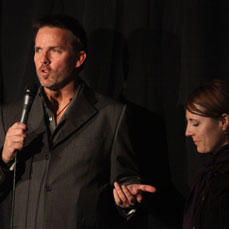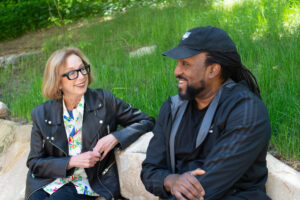Jeff Hanson
It can be easy to assume that the world’s refugees are the unfortunate and senseless collateral damage of political, military, and racial repression. But what of the countless millions of souls who fall victim to the devastating effects of climate change and are forced to move from their homelands to other parts of the world where they may not be so welcome? Veteran filmmaker Michael Nash circled the globe to put a very real and poignant face on the migratory effects of environmental change in Climate Refugees, which premiered Saturday night at the Festival. After the screening, Nash took part in a Q&A along with producer Justin Hogan, and environmental migration expert Koko Warner.
Q: What was the most surprising thing you discovered in making this film?
Nash: I think nothing would be more frightening than if we woke up tomorrow morning and the scientists said, “You know what? We’ve proven that man is not causing this.” I’ve been there. I’ve seen the destruction that is going on all around the world. We better hope that man is causing this because it’s our only hope to fix it. The other thing that was surprising was the spirit of the human being that lived throughout all the places we went. These places in Bangladesh that got wiped out, they don’t call Allstate and a check shows up in the mail and they rebuild their house. Everything that they have is gone. But the spirit they had and how they go through their daily life is absolutely unbelievable.
Q: Can you talk about some of the logistical challenges you had making the film?
Nash: We went so deep into China that our Mandarin translator needed another translator to speak to the person living in this village. I would ask a question, “Ask them what their thoughts are on the changing climate,” and she would look at me, “They don’t know anything about climate change.” And I would say,”I’m not asking you; I want you to translate that.” We had a really difficult time working with the crew in China.
Hogan: Another place we visited was Chad. We were at the embassy checking in. We could see machine gun bullets on the wall from when they had been hit six months earlier. We met an American guy there who said that if somebody gave the Bloods and the Crips a country, it would be Chad. Everywhere we went was with armed escorts. We had to get on U.N. flights that sometimes were there, sometimes weren’t. We were behind barbed wire the entire time. When we were up in the refugee camp we were one mile from Darfur and rebel planes were flying around. It was pretty hairy and logistically very hard to put together.
Warner: We’ve talked with many, many migrants. People want to stay home. They don’t want to go. It’s their home; it’s their life. But all over the world people are finding it increasingly difficult to survive, and they are looking for ways to stay. We’re trying to find solutions to do that, and this movie is very powerful because it tells a story and we researchers aren’t often that good at telling stories. We’re all about the head, and this movie is about the heart and that has a lot of power. Now is the time that we can start making changes. The end of this movie emphasized hope and we have that hope. But it also emphasized action. We do have the power to make changes.




